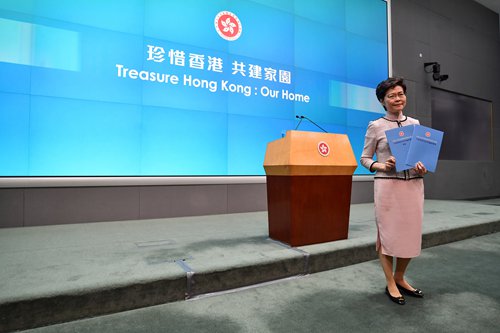HOME >> CHINA,SPECIAL-COVERAGE
Hong Kong chief executive tackles social, economic woes in policy speech
By Wang Cong in Hong Kong and Xu Keyue in Beijing Source:Global Times Published: 2019/10/16 21:03:40 Last Updated: 2019/10/16 23:44:05

Hong Kong's Chief Executive Carrie Lam attends a press conference in Hong Kong on October 16, 2019. Photo: AFP
Hong Kong Special Administrative Region (HKSAR) Chief Executive Carrie Lam Cheng Yuet-ngor on Wednesday announced a slew of policy initiative to address social and economic challenges in the city and urged society to stop attacking each other and return to normalcy for the sake of Hong Kong's future.
In her annual policy address, Lam also drew a red line as political unrest continues in the city, saying that the government will adhere to "one country, two systems" and not tolerate acts that threaten China's sovereignty and violate the principle.
The policy address, coming at a sensitive time when Hong Kong is engulfed in months of violence and in a political impasse, was met with mixed reactions in the city. Some hailed the government's initiatives to address deep-seated social and economic issues while others criticized the speech for falling short of meeting public demand.
In a show of the depth of the current political impasse in Hong Kong, Lam was disrupted by radical legislators as she tried twice to give the traditional speech at the Legislative Council (LegCo) but was forced to deliver it instead by video feed.
Some even heckled the chief executive and threw posters at her when she was escorted out of the room. Their behavior led to the suspension of LegCo meetings on its first day back since violent protesters stormed the complex and forced the council into a recess.
A planned formal withdrawal of the extradition bill - one of the five demands of the protesters - was also disrupted.
Li Xiaobing, an expert on Hong Kong, Macau and Taiwan, from Nankai University in Tianjin, said the "rude, crazy" behavior disrupted the normal functioning of government and did not help address the impasse.
"The hindrance further deviated the focus from the core demands of the public, obstructed Hong Kong from getting out of the dilemma," he told the Global Times on Wednesday.
Despite the drama at LegCo on Wednesday and the political unrest on the streets, the chief executive tried to strike a positive note on what she described as the "most formidable challenge since our return to the motherland."
"So long as we have unwavering confidence, adhere to the 'one country, two systems' principle, stop violence in accordance with the law and restore social order as early as possible, Hong Kong will soon be able to emerge from the storm and embrace the rainbow," she said.
Social focus
In the around 50 minute-long speech, Lam focused largely on economic and social challenges including housing, infrastructure, education and healthcare, announcing 220 policy initiatives.
Noting housing as the "toughest" issue, Lam announced measures including allocating HK$5 billion to build 10,000 transitional apartments over the next three years and offering subsidies for low-income families on the waiting list for public housing.
To increase housing supply and ease the burden on residents seeking to buy homes, the chief executive said the government would increase the land supply for building public housing and relax mortgage ceilings for home buyers.
"Housing is the one of the biggest problems in Hong Kong. The policy address offered many solutions, which, if implemented… could help ease public grievances," Liang Haiming, a Hong Kong economist, told the Global Times on Wednesday.
Lawrence Tang Fei, a member of the Chinese Association of Hong Kong and Macao Studies, also said that housing was the most pressing issue and that Lam's proposals "deserve to be praised from a long-term perspective."
Tang pointed out that Lam's plan to resume 400 hectares of private land was five times that was resumed over the past five years.
In other attempts to address social and economic issues, Lam also announced more subsidies for students and low-income households. In an infrastructure push, she said the government has invited MTR Corp, the city's subway operator, to plan and design three new rail lines.
Noting that Hong Kong's economy faces unprecedented challenges from the the China-US war as well as the violent social unrest in the city, Lam offered policy and tax support for businesses, including seeking tax incentives from central government departments and increasing subsidies for small exporters.
Mixed responses
Many pro-establishment observers welcomed Lam's focus on social and economic challenges, widely viewed as one of the sources of public grievances and fueling unrest on the streets.
Some criticized the chief executive for not tackling the political unrest head on.
"I suspect many people had hoped to see the chief executive address Hong Kong's current situation and how we can work to stop the violence and riots, but we did not see such initiatives in the speech," Alice Mak Mei-kuen, a member of LegCo, told the Global Times on Wednesday.
Lam did not offer any specific support for the city's police force, Mak said. The speech should have outlined support for the police including equipment, personnel and laws, "but there was none," Mak said.
Meanwhile, anti-government legislators criticized the chief executive for failing to respond to protesters' demands, including a probe into police practice.
Lam had already announced the withdrawal of the extradition bill, which first sparked the protests. She argued on Wednesday that addressing social and economic issues while adhering to "one country, two systems" will help Hong Kong get out of the current impasse.
"There are many policies and the content of the policy address is much richer than previous policy addresses," Tang said.
Posted in: HK/MACAO/TAIWAN,LATEST NEWS